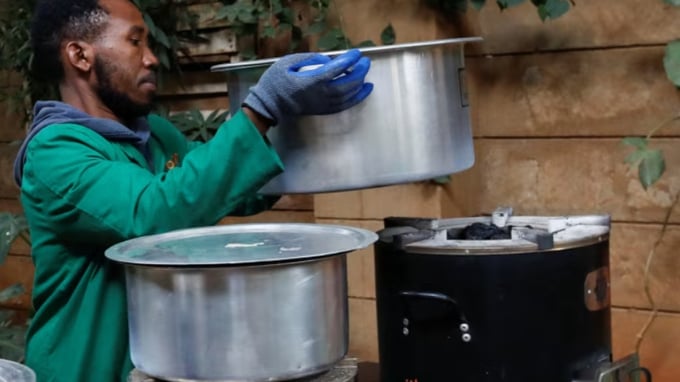May 30, 2025 | 12:45 GMT +7
May 30, 2025 | 12:45 GMT +7
Hotline: 0913.378.918
May 30, 2025 | 12:45 GMT +7
Hotline: 0913.378.918

A worker demonstrates clean cookstoves used to reduce carbon emissions at the Burn factory in the Ruiru area of Kiambu County, Kenya.
A type of carbon credit used by companies including Eon, Shell, easyJet and British Airways in the past year to justify continuing to pollute through their own operations is largely worthless, a new study finds.
Carbon credits represent 1 tonne of carbon emissions in theory, but nine in 10 of the 96mn so-called cookstove credits certified by leading carbon registries do not avoid the emissions they claim, researchers at the University of California Berkeley, wrote in a peer-reviewed article published on Tuesday.
Cookstove credits are one of the fastest-growing project types on the voluntary carbon market, issued when cleaner or less energy-intensive cookstoves are distributed to communities traditionally reliant on dirty fuels including wood or kerosene, causing premature death.
German utility Eon, energy giant Shell and the airlines easyJet and British Airways are among the biggest corporate buyers of the popular cookstove credits, according to Financial Times analysis of the largest crediting registry Verra.
In response to the study findings, British Airways said that carbon offsets and removals had an “important interim role to play” while the airline worked on decarbonising its business. Easyjet said it had moved away from investing in carbon credits but that it had previously used “rigorous assessment and due diligence by expert partners” to select projects.
Eon said it did not use “current emission compensation measures” to achieve its climate targets. Shell declined to comment. The academics’ review of about 40 per cent of all the credits issued on the market estimated these led to 9.2 times fewer avoided emissions than claimed, because of over-optimism about how often cleaner cookstoves were used and the emissions saved by each one.
It also estimated that cookstove credits sold on the basis of some of the most popular methodologies in the market had led to at least 10 times fewer avoided emissions than claimed. Barbara Haya, co-author and founder of the Berkeley Carbon Trading Project, said the credits were “being used to justify ongoing emissions, sell carbon neutral products and convince consumers they can continue consuming, driving and flying without impacting the planet, which is simply not true”.
An open letter from carbon project developers and researchers in September, responding to a preliminary version of the Berkeley paper, noted the research was funded by sources including the Better Cooking Company, a US company with subsidiaries that distribute cleaner cookstoves in Kenya and Uganda. The authors responded that the biggest source of funding was the National Science Foundation, a US government agency, with Better Cooking providing about 5 per cent of the funding.
The open letter also criticised the academics for focusing on larger cookstove projects, which it said typically issued more credits per stove distributed than smaller projects. Carbon credit registry Verra said it had “substantive concerns” about the research.
Verra has come under fire from academics in the past for the techniques it uses to certify deforestation avoidance credits. Verra said it was working on a new methodology that “includes several updates and changes that reflect current best practices of project design and implementation in distributed thermal energy generation”.
Another critical carbon registry, Gold Standard, said the paper’s findings did not reflect the market as a whole. But its chief technical officer Owen Hewlett said it highlighted a “tension true to the whole carbon market”, namely that “the instrument is estimating the tonne and not measuring it at source”.
While the scenarios used to generate credits may be hypothetical, proponents argue they crucial to raising finance for the real problem of greenhouse gas emissions and toxic particles produced by household food preparation in developing countries.
The Clean Cooking Alliance, which has the Dutch, Canadian and US governments among its backers, said it was working on an improved methodology for credits, with input from the UN climate body, as well as Verra and Gold Standard.
About 2 per cent of global annual emissions come from burning wood fuels for cooking, while smoke inhalation from cooking causes up to 4mn premature deaths annually, according to the CCA. The issue is “dramatically underfunded” given its contribution to global warming and ill health, said the CCA’s chief executive Dymphna van der Lans.
“The carbon market is a potential game changer to fill this gap,” she added, even if “measuring emissions reductions from cookstove projects is inherently difficult and resource intensive”.
(FT)

(VAN) Vikas Rambal has quietly built a $5 billion business empire in manufacturing, property and solar, and catapulted onto the Rich List.

(VAN) Available cropland now at less than five percent, according to latest geospatial assessment from FAO and UNOSAT.

(VAN) Alt Carbon has raised $12 million in a seed round as it plans to scale its carbon dioxide removal work in the South Asian nation.

(VAN) Attempts to bring down the price of the Japanese staple have had little effect amid a cost-of-living crisis.

(VAN) Fourth most important food crop in peril as Latin America and Caribbean suffer from slow-onset climate disaster.

(VAN) Shifting market dynamics and the noise around new legislation has propelled Trouw Nutrition’s research around early life nutrition in poultry. Today, it continues to be a key area of research.

(VAN) India is concerned about its food security and the livelihoods of its farmers if more US food imports are allowed.